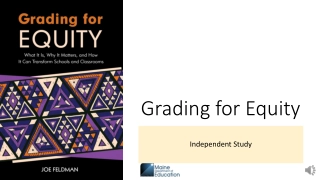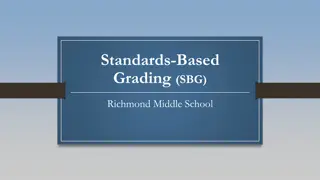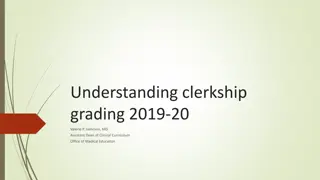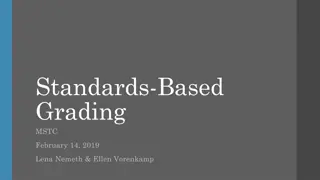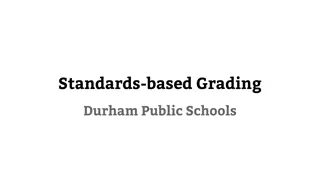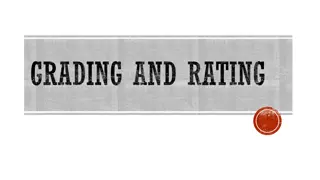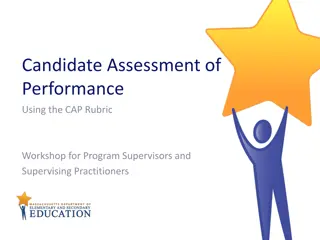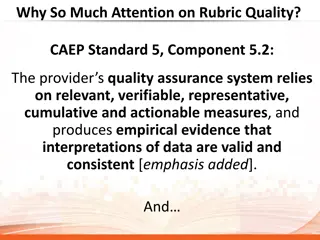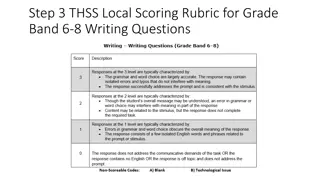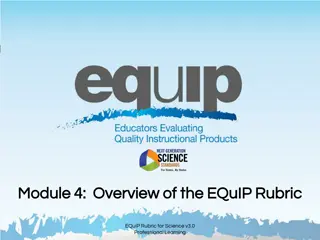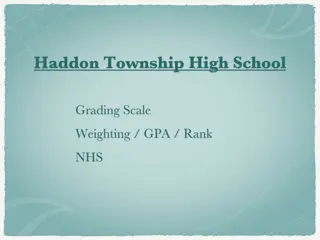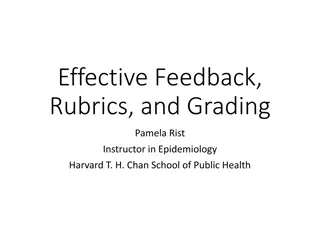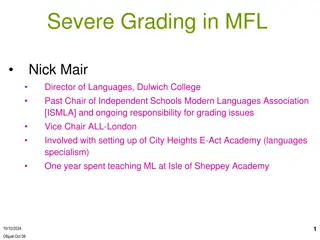Grading for Equity Independent Study Program
Explore the concepts of equitable grading with a focus on historical context, bias recognition, and motivational elements. Join thought partners in studying Joe Feldman's book to transform grading practices for all students. Engage in live facilitated discussions and sessions to delve into the princ
3 views • 11 slides
Review of Grading Practices in PWCS and BRMS
This document outlines the assessment and grading practices in Prince William County Schools (PWCS) and Bull Run Middle School (BRMS) with a focus on providing feedback, enhancing student learning, and aligning assessments with learning outcomes. It includes information on assessment purposes, forma
3 views • 12 slides
Cybercrime Course Overview: Syllabus, Materials, and Grading
This Cybercrime course overview introduces Dr. Matthew Petrocelli as the instructor and details the syllabus organization, course materials, and grading system. The course is structured into 10 learning units covering various aspects of cybercrime, including information assurance, cyber law, investi
9 views • 11 slides
Standards-Based Grading (SBG)
Richmond Middle School implements Standards-Based Grading (SBG), focusing on student mastery of learning standards rather than traditional grading methods. The school emphasizes the importance of meaningful grades that reflect achievement of learning goals, providing students with opportunities to r
0 views • 19 slides
Overview of Acute Cholecystitis: Diagnosis, Severity Grading, and Treatment
Acute calculous cholecystitis is a common digestive disease with varying treatment perspectives. The Tokyo Guidelines 2018 provide criteria and severity grading for the diagnosis of acute cholecystitis. Diagnosis involves local and systemic signs of inflammation along with specific imaging findings.
1 views • 18 slides
Equitable Grading Practices: Pillars, Zero Policies, and Minimum Grading
Explore the three pillars of equitable grading: accuracy, bias-resistance, and motivation. Learn about the impact of giving zeros on student grades and discover alternative approaches. Delve into the concept of minimum grading and how adjusting grading scales can enhance student engagement and succe
2 views • 48 slides
Food Processing Operations: Cleaning, Sorting, and Grading
Food processing operations such as cleaning, sorting, and grading are crucial to ensure high-quality and safe food products. Cleaning removes contaminants, sorting separates foods based on physical properties like size and color, and grading ensures uniformity. Wet and dry cleaning methods are emplo
1 views • 11 slides
Grading and Staging of Malignant Tumors in Cancer Patients
Grading and staging are crucial in determining the aggressiveness and extent of malignant tumors. Grading involves assessing the level of malignancy based on cell differentiation and mitotic activity, while staging considers the size of the tumor, lymph node involvement, and presence of metastases.
7 views • 31 slides
Mastering Color in Film: A Comprehensive Guide to Using Color Grading Techniques
Explore the intricate world of color in filmmaking through understanding color grading, log explained, Log rec.709, color correction, and grading techniques without LUTs. Enhance your storytelling by harnessing the power of color to evoke emotions and create visual impact in your films.
4 views • 6 slides
Understanding Clerkship Grading in Medical Education
Clerkship grading in medical education provides feedback on a student's performance and readiness to become a competent physician. Grades in pre-clinical years are often based on objective data from multiple-choice testing, while clinical years involve assessing a broader range of skills including p
0 views • 23 slides
Standards-Based Grading: A Comprehensive Overview
Exploring the evolution and purpose of grading systems, this presentation delves into the history, research findings, and necessity for adopting standards-based grading. Through a series of engaging activities and discussions, stakeholders gain insights into the impact of grading on student learning
1 views • 33 slides
Transitioning to Standards-Based Grading in Education
Evaluation of learner performance through traditional grading may not align with the skills required in the workforce. To address this, a shift to standards-based grading is advocated. This system assesses student progress based on specific learning standards, providing clear feedback and evaluation
0 views • 33 slides
Enhancing Assessment Strategies in Education: A Focus on Standards-Based Grading
Explore the principles of standards-based grading in education, emphasizing the importance of consistent, meaningful, and accurate grading to support student learning. Learn how grades should reflect a student's understanding at a specific time and how assessments can communicate performance on indi
0 views • 30 slides
IMBA English Fall 2019: Lesson 8 Course Overview and Grading Details
Course outline of IMBA English Fall 2019 Lesson 8 includes a breakdown of the grading scheme, details on assignments, participation, performance in court case activities, and final exam structure. The summary also emphasizes the importance of following instructions for PPT submissions and how to add
0 views • 75 slides
Guide to Grading and Rating Process for Chess Tournaments
Learn the step-by-step process of submitting tournament results for grading and rating, including generating FIDE-rating and ECF-grading files. Understand the importance of FIDE IDs, updating player information, and handling new players without FIDE IDs. Follow clear instructions on generating and h
1 views • 8 slides
TDES Redesign Quarter 1 School Training Overview
In this training session facilitated for TDES School Team Members, participants will delve into the changes in the TDES system and rubric, understand HQSD evidence, PGP/PIP processes, and FAO procedures. The session also covers the changes to Article 13 of the CBA. Materials needed include the TDES
0 views • 47 slides
Enhancing Mathematical Learning Through Innovative Grading Techniques
Valparaiso University implemented an alternative grading system in their calculus courses to improve student performance, particularly for underrepresented minority and first-generation students. The standards-based grading method emphasized deep understanding of essential topics, leading to better
2 views • 12 slides
Candidate Assessment of Performance Using the CAP Rubric: Workshop Overview
This workshop conducted for program supervisors and supervising practitioners focuses on utilizing the CAP Rubric to assess candidate performance. The agenda includes warming up, learning about the CAP Rubric, understanding its goals and purposes, and detailing the CAP process. Participants engage i
0 views • 39 slides
Classroom Expectations and Student Behaviors with Mrs. Ivani: Srednja trgovska ola Ljubljana
Explore the classroom expectations for English class with Mrs. Ivani at Srednja trgovska ola Ljubljana, focusing on student behaviors, respect, responsibility for coursework, promoting lifelong learning, policies, and grading criteria. Ensure punctuality, preparedness, respect for others, responsibi
0 views • 8 slides
Evaluation Criteria and Scoring Rubric for Arts and Culture Funding Applications
This document outlines the evaluation criteria and scoring rubric for funding applications in the arts and culture sector. It covers the quality of offerings, impact, track record, and other key aspects that will be assessed during the review process. Applicants must demonstrate the quality of their
0 views • 21 slides
Shark Tank Spring 2014 Economics - Business Plan and Presentation Grading Criteria
In the Shark Tank Spring 2014 Economics, the grading criteria were based on a 60% evaluation of the Business Plan and a 40% assessment of the Presentation. The Business Plan required thorough answers to questions ranging from product details to funding strategies and legal requirements, while the Pr
0 views • 17 slides
College Poster Project Schedule and Grading Details
Schedule and details for a college poster project, including assignments, due dates, research objectives, grading criteria, and presentation expectations. Students are required to research and present information about their dream colleges, focusing on various aspects such as location, size, academi
0 views • 25 slides
Updates on Graduate School Policy and Interim Grading for Spring 2020
Explore the latest policy updates for graduate school including the interim grading policy for Spring 2020. Learn about options for grading, deadlines for decisions, and resources available to address questions and concerns. Understand the difference between grades like W and NCR and how they impact
0 views • 12 slides
Enhancing Rubric Quality in Educational Assessment
The focus on rubric quality in education, particularly in meeting CAEP Standard 5, Component 5.2 for quality assurance systems, is crucial for generating valid, reliable, and actionable data. CAEP now allows early submission of assessment instruments to improve data quality. However, common weakness
0 views • 22 slides
Mastering Newsela: Tips for Success in Reading and Grading Rubric
Enhance your Newsela reading skills by following grading rubrics and guidelines provided. Learn how to read within your current Lexile range, answer comprehension questions, create meaningful annotations, and craft a well-supported write response. Utilize highlighter colors effectively, challenge yo
0 views • 9 slides
Vanderbilt Nursing Professional Advancement Rubric
Vanderbilt Nursing Professional Advancement Rubric outlines criteria and expectations for nurses to excel in various leadership, empowerment, knowledge, and practice areas. The rubric covers aspects like transformational leadership, structural empowerment, new knowledge acquisition, and exemplary pr
1 views • 55 slides
THSS Local Scoring Rubric for 6-8 Grade Band Writing Questions
The THSS Local Scoring Rubric provides guidelines for grading writing questions in grades 6-8. Students are required to craft questions for a visiting journalist, ensuring they are complete sentences. The example responses showcase a range of student engagement and language proficiency levels.
0 views • 10 slides
Updates to Quality Matters 7th Edition Higher Education Rubric
Quality Matters (QM) has made significant updates to its 7th Edition Higher Education Rubric, including changes to point values, specific review standards, course resources, and overall wording. The new rubric emphasizes creating welcoming and inclusive courses, with key changes in terminology and a
2 views • 20 slides
Education Updates and Grading Policy Adjustments during School Closure
Amidst challenges like varied access to technology and disruptions in schooling, Syracuse City School District implements measures to support students during closure. Actions include guidance for making up work, stakeholder outreach for feedback on grading alternatives, and adjustments in the gradin
0 views • 7 slides
Vanderbilt Nursing Professional Development Rubric
The Vanderbilt Nursing Professional Development Rubric outlines key areas of excellence and recognition criteria for nurses to advance in their careers. It covers transformational leadership, structural empowerment, new knowledge acquisition, and exemplary professional practice. The rubric encompass
0 views • 56 slides
The EQuIP Rubric for Science: A Comprehensive Overview
Delve into the EQuIP Rubric for Science v3.0, exploring its development, structure, history, and key points. Learn about its purposes and objectives, including reviewing lessons, providing feedback, identifying exemplars, and informing new lesson development. Discover the three-category structure of
0 views • 12 slides
Physical Education Grading Policy and Procedures at CDHS
Physical Education at CDHS follows a detailed grading policy where each class is worth 10 points. Points are earned based on participation, effort, behavior, and adherence to rules. Deductions can occur for violations such as tardiness, inappropriate behavior, lack of participation, and disrespect o
0 views • 22 slides
Insights from Discussions with Admissions Officials on School Profiles, Grading Scales, and Admissions Criteria
Discussions with university officials shed light on the importance of school profiles, grading scale variations, and admissions criteria. Insights include the significance of school profiles, diversity in grading scales, and the role of NHS in the admissions process. Admissions offices consider fact
0 views • 25 slides
Mastering Rubric Design for Effective Assessment
Rubrics are essential tools in evaluating and providing feedback on student performance. This comprehensive guide covers the definition, elements, and benefits of rubrics, along with expert tips on designing impactful rubrics for various assessments. Explore the art of rubric design, learn what make
2 views • 30 slides
Rethinking Grading Systems in Education
Research suggests that traditional grading systems may hinder student learning and motivation, leading to decreased interest, shallow thinking, and cheating. Ungrading, a more student-centered approach, promotes intrinsic motivation, allowing students to have a say in their assessment and emphasizin
0 views • 16 slides
Effective Feedback Strategies for Grading in Epidemiology Courses
In teaching epidemiology courses, maintaining consistency in grading among multiple TAs is crucial. Providing high-quality feedback is essential as it builds the foundation for future learning. This article emphasizes the importance of effective feedback, tips for giving feedback, creating grading k
0 views • 12 slides
Severe Grading in Modern Foreign Languages: A Comprehensive Review
Delve into the extensive history and ongoing efforts regarding severe grading in Modern Foreign Languages (MFL) by key figures such as Nick Mair, with collaborations from organizations like ISMLA, ALL, and ASCL. Learn about the challenges, debates, and initiatives surrounding MFL grading issues over
0 views • 24 slides
Getting Started with Specifications Grading in Computer Science
Dr. Michael S. Kirkpatrick from JMU presents a detailed grading scheme involving readiness tests, project deadlines, reflections, team projects, and exams in his symposium on specifications grading. The importance of grading and its impact on learning outcomes are discussed, along with insights on e
0 views • 25 slides
Exam Rubric and Guidelines for European Theatre Module
The content discusses important information regarding the exam rubric for the European Theatre module, including guidelines on time limits, permitted topics, penalties for violations, and advice on handling exam questions. It clarifies rules on writing about the same texts as in coursework essays, s
1 views • 29 slides
Welcome to Ready, Set,Rubric
This insightful content covers the importance of rubrics in education, explaining the ground rules for discussions, benefits of rubrics for students and faculty, types of rubrics, parts of rubrics, and a class participation rubric. Explore how rubrics clarify expectations, streamline grading, promot
0 views • 12 slides
